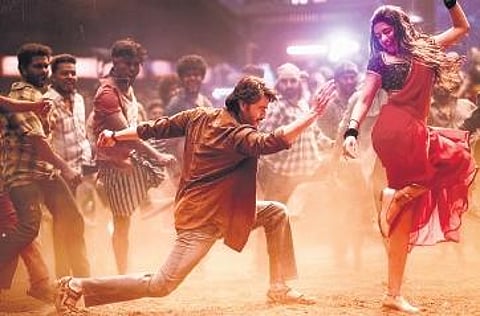

In a film that takes a painfully long route to prove that nothing is what it seems, especially with mothers, one leitmotif sticks out. A 10-year-old Ramana (Mahesh Babu) loses his vision partially in one eye as embers of a fire strike the pupil. The fire emerges from a factory explosion in Guntur, right at the beginning of the film. Another cruel act of fate instantly strikes, as his mother (Ramya Krishnan) exits his life, to marry another man and birth another child. Throughout the film, we see Ramana struggle with his eyesight. To make up for the blurriness in his left eye, he squints hard with the right, wrapping his palm around it like a cone. While watching the film, it comes off as a cool personal quirk, like the way he lights his beedis. But in retrospect, it unravels a deeper meaning.
As Ramana spends most of the film crying and complaining about being abandoned by his mother, the writers of Guntur Kaaram hold their cards close, just in time for the other shoe to drop, proving that Ramana himself was acting with only half the knowledge behind what happened to his mother. His blurry eyesight is a metaphor for his hazy awareness. The explanation behind the actions that transpire in the first ten minutes of the film is satisfying, but by the time they do arrive, the audience is uninterested. And exhausted. They just want to shut their eyes (pun intended).
The second half of the film, which classifies as the better eye, sorry, half, a relatively riveting revelation makes one mentally travel back in time, through the first half that felt five hours long. Why didn’t the makers opt to make Guntur Kaaram into a high-stakes action drama centered around a political conspiracy? A plot involving an heir could have been designed as a tug-of-war with progressively rising conflicts. What we do get instead is the flattest of jokes and a rehash of Trivikram’s fondness for reinforcing eugenics, picking up right where he left it in Ala Vaikuntapuramulo (2020).
How did Trivikram make Athadu (2005)— a film that had a character tell the protagonist that he has earned the right to be a family’s rightful heir by his actions not birth — and then follow that up with the likes of Ala Vaikuntapuramulo and now Guntur Kaaram, which effectively convey the message that people are about as good or bad as the family they were born into? Where do orphans fit in this equation? I am only asking this question since one character does come out as an orphan in Guntur Kaaram. The mythological inspiration (s), as is the case with many a Trivikram film, are certainly around. For all purposes, Ramana is a modern-day Karna pining for Ramya Krishnan’s Kunti.
Ramya Krishnan and Easwari Rao’s characters, on the other hand, subtly mimic the parallel dynamics of an absentee birth mother and an ever-present adoptive mother, a la Devaki and Yashodha. But Guntur Kaaram rarely shovels enough depth — the kind of depth you expect from a story with mythological elements, the kind of depth you expect from Trivikram’s films, the kind of depth you would ever expect from a festival film (which isn’t much in the first place) — into its narrative. The treatment of the film is about as flat as visuals tend to be when you begin seeing with one eye alone.
The first half of the film follows Ramana as travels in his jeep from Hyderabad to Guntur and Guntur to Hyderabad. We are told it is because his grandfather (Prakash Raj, who has seemingly jumped into the world of Guntur Kaaram straight from the sets of Rangasthalam), wants his signature on a series of legally damning documents. If not for this reason, I would have been convinced the film was a two-and-half hour-long advertisement for the Vijayawada-Hyderabad expressway. Not to mention additional brand placements for Greater Hyderabad’s Outer Ring road. The rest of Guntur Kaaram is mere filler. While yours truly is no stranger to Trivikram’s (or Mahesh Babu’s) passion for dialogues intended to neg women, the intensity and the sheer uncouthness of it all here made the viewing experience a particularly unpleasant one. It certainly does not help that the film’s leading ladies — a Meenakshi Chaudhary, whose role is as significant as furniture, and a Sreeleela, whose role is as significant as furniture that can dance — are two and half decades younger than Mahesh Babu.
While the film’s leading man looks like a dream and still manages to bring a smile to people’s faces, his performance stands alone, nay abandoned, in a film, receiving scant support from the creative and technical developments. Which direction have the film’s makers looked in while making this film? Doesn’t making a big-ticket star vehicle inherently mean the filmmakers have to put in more effort and not less? Guntur Kaaram puts the sigh in sight, best kept away from one’s eyes like a jar of chilli powder.
Guntur Kaaram
Director: Trivikram Srinivas
Cast: Mahesh Babu, Sreeleela, Meenakshi Chaudhary, Ramya Krishnan, Prakash Raj, Easwari Rao, Jayaram, Vennela Kishore
Rating: 2/5